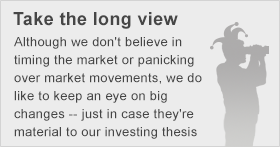
What: Another day, another week, same old issue for Valeant Pharmaceuticals (VRX 10.05%). Shares of the pharmaceutical company are down about 10% today on continued worries about drug pricing.
So what: The New York Times threw fuel on the fire this weekend with an op-ed and an article about how the company's tactics are upsetting patients and lawmakers. Neither has any new news, but they certainly don't cast Valeant Pharmaceuticals in a good light. For example, one of the articles cites a Deutsche Bank analysis that says Valeant Pharmaceuticals raised prices on its brand-name drugs by an average of 66% this year.
This issue has been going on for two weeks since presidential candidate Hillary Clinton tweeted that she had a plan to keep drug prices at bay. Valeant Pharmaceuticals' stock has fallen dramatically since then.
Maybe there are investors that are just waking up to the story and hitting the sell button today. Maybe it's investors that have decided enough bad press is enough.
But I think it's hard to argue that Valeant Pharmaceuticals is fundamentally worth less today than it was Friday even if sentiment says otherwise.
Now what: Three things could ultimately come of this pricing issue:
- Nothing, which would certainly be good for Valeant Pharmaceuticals.
- Valeant stops its dramatic raising of prices either through government intervention or on its own because of the bad press.
- Valeant is forced to lower the prices of its drugs.
While stopping the practice of raising drug prices would affect the company's business model, many of the large raises have come on drugs sold by companies Valeant purchased, making it less of an issue going forward. Lowering prices would certainly be a lot worse.
It seems unlikely, although certainly not impossible, that the government will pass any drug pricing laws in an election year, and even after we have a new President and Congress, there are political issues that make it difficult. It's also important to keep in mind that new laws -- setting maximum out-of-pocket expenses for patients, for instance -- might not have any direct effect on drug prices, instead costing insurers more, which will be passed onto consumers in the form of higher insurance premiums.







